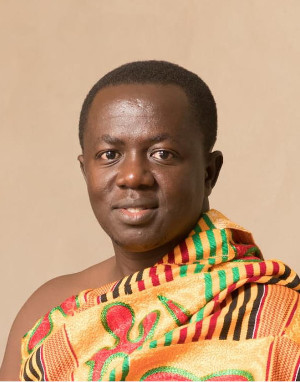
Dr. Dr. Seth Christopher Yaw Appiah
My name is Dr Seth Christopher Yaw Appiah from Kumasi, Ghana. I am currently a Lecturer at the Department of Sociology and Social Work at the Kwame Nkrumah University of Science and Technology (KNUST) in Kumasi, Ghana and a visiting lecturer at PAULESI-University of Ibadan Nigeria (PAULESI). I had training for my PhD in Medical Research International Health from the Ludwig-Maximilian Universität München (LMU) and Reproductive Health Sciences from the PAULESI, University of Ibadan, Nigeria. My research expertise comprises medical sociology-HIV and infectious diseases, gender, migration health, human rights and social protection and adolescent sexual reproductive health.
Current affiliation
- Department of Sociology and Social Work, Kwame Nkrumah University of Science and Technology, Ghana
Hosting institute
Contact
- Email: …
Key expertise
- Gender intersectionality
- Migrant and Refugee Health
- Displacement and Climate mobilities, and Human Trafficking
- Health Ethics
- Artificial Intelligence and Ethics
- Social Protection
- Human Right and Sexuality Law
- Social Medicine
- HIV and Adolescent Health
- Population and Public Health
Profile according to FFVT taxonomy
Fields of research
- Development Research
- Human Rights Research
- Migration Research
Scientific topics
- Conflict Mediation
- Economy Of Forced Migration
- Education
- Environment And Climate
- Experience Of Violence, Trauma
- Family
- Gender
- Health
- Infrastructure Of Flight / Forced Migration
- Integration And Social Participation
- Migration Routes, Refugees’ Journeys
- Refugee Camp
- Work / Labour Market
Disciplines
- Anthropology
- Demography
- Law
- Medical And Health Sciences
- Social Work
- Other
Professional Career
PhD Medical Research International Health Ludwig-Maximilans-University Munich
PhD Reproductive Health Sciences, Paulesi, University of Ibadan
MPhil Sexual Reproductive Right in Africa, Pretoria
MPhil Sociology, Kwame Nkrumah University of Science and Technology, Kumasi
BA Sociology and Social Work, Kwame Nkrumah University of Science and Technology, Kumasi
Relevant publications
- Adonoo, P., Appiah, S. C. Y. Diaspora Governance: The Instrumentality of Informal Religio-Politico Structures for Migrant Integration among Ghanaian Diaspora in Guangzhou, China. In Advances in Applied Sociology, 9(8), 357-369. 2019. Scientific Research Publishing.
- Appiah, S. C. Y., Ivanova, O., Hoelscher, M., Kroidl, I., Dapaah, J. M. Disclosure of HIV/AIDS status to infected children in Ghana-a north- south comparison of barriers and enablers. In Children and Youth Services Review, 122(105753). 2021.
- Obeng, M., Appiah, S. C. Y. Indigenous justice delivery in land conflict resolution: The case of the paramount Chief court in the Oguaa Traditional area, Ghana. African Union Scientific Technical Research Commission (ASRIC). In Journal on Social Sciences & Humanities 1(1), 37-49. 2020. SAGE.
- Yalley, A. A. , Abioye, D., Appiah, S. C. Y., Hoeffler, A. Abuse and humiliation in the delivery room: Prevalence and associated factors of obstetric violence in Ghana. In Frontiers in public health, 11(p.988961). 2023. Frontiers Media S.A.
- Sawicki, A. J., Żemojtel-Piotrowska, M. , Balcerowska, J. M. , Sawicka, M. J. , Piotrwoski, J., Sedikides, C., Appiah, S. C. Y., Ardi, R., Babakr, H. Z., Zand, S, et. al. , . The fear of COVID-19 scale: its structure and measurement invariance across 48 countries. In Psychological Assessment 34(3), 294–310. 2022. American Psychological Association.
Research profile
Q1. Who are you?
My name is Dr Seth Christopher Yaw Appiah from Kumasi, Ghana. I am currently a Lecturer at the Department of Sociology and Social Work at the Kwame Nkrumah University of Science and Technology (KNUST) in Kumasi, Ghana and a visiting lecturer at PAULESI-University of Ibadan Nigeria (PAULESI). I had training for my PhD in Medical Research International Health from the Ludwig-Maximilian Universität München (LMU) and Reproductive Health Sciences from the PAULESI, University of Ibadan, Nigeria. My research expertise comprises medical sociology-HIV and infectious diseases, gender, migration health, human rights and social protection and adolescent sexual reproductive health.
Q2. What was your motivation for applying for the FFVT fellowship? Why Germany?
I have been motivated to apply to the FFVT when I considered the particular focus on the human rights dimension to refugee and forced migration studies at the CHREN. I was further motivated by the observation that the objectives of the FFVT align with my career ambition of enhancing my research collaboration, internationalisation and facilitating trans-disciplinary and cross-cultural knowledge co-creation, acquisition and sharing. Germany remains my number one country of international travel partly because I pursued my training for my PhD here, Germany has diverse academic domains, specific experts. I also believe that all my host professors have been—and continue to be—exceptional, including the current host Professor Dr Petra Bendel, who has made me miss home to a lesser degree.
Q3. What do you expect from the fellowship?
In this fellowship, I am looking forward to sharing my knowledge with other members of the team coming from an interdisciplinary background of sociology, public/international health, infectious diseases, migrant and refugee health, gender and human rights. I look forward to learning so much in a field I am relatively new to—the study of camps and refugees—and to building long-lasting research collaborations, partnerships with prospects for joint grant applications, and potentially the co-supervision of doctoral students on thematic issues of refugees, migrants, gender, health and human rights in the near future.
Q4. What is the focus of your work, and what is innovative about it? / What are your planned outcomes and activities for the fellowship period? And how do they relate to your FFVT hosting institution/ the FFVT cooperation project?
My current proposed study seeks to examine access to vaccines among one refugee camp in Ghana—the Krisan refugee community—and the levels of vaccine hesitancy, myths and associated intention to accept. Within the fellowship period, I am designing the study tools, networking to engage potential researchers and scientists with similar interests to collaborate on this proposed study.